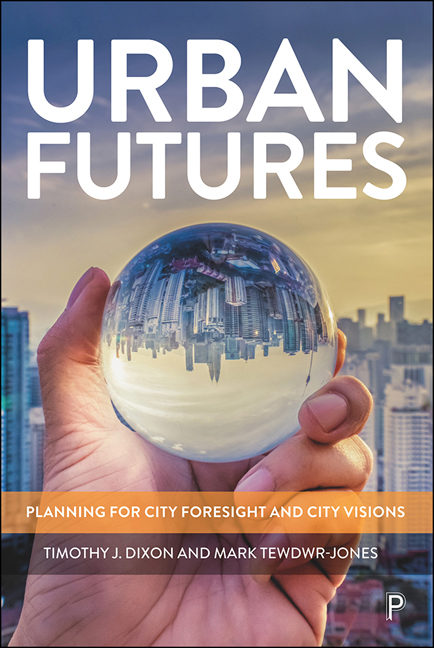Book contents
- Frontmatter
- Contents
- List of figures, tables and boxes
- Acknowledgements
- Foreword
- Preface
- 1 Urban futures: planning for city foresight and city visions
- 2 Cities and integrated urban challenges
- 3 Reimagining the city: views of the future from the past and present
- 4 Planning and governing the future city
- 5 Future narratives for the city: smart and sustainable?
- 6 Theoretical approaches to urban futures
- 7 Using city foresight methods to develop city visions
- 8 Shaping the future: city vision case studies
- 9 The innovative and experimental city
- 10 Visioning and planning the city in an urban age: a reality check
- 11 Conclusions: facing the urban future to 2050 and beyond
- Appendix: selected examples of city visions
- Notes
- References
- Index
2 - Cities and integrated urban challenges
Published online by Cambridge University Press: 21 December 2021
- Frontmatter
- Contents
- List of figures, tables and boxes
- Acknowledgements
- Foreword
- Preface
- 1 Urban futures: planning for city foresight and city visions
- 2 Cities and integrated urban challenges
- 3 Reimagining the city: views of the future from the past and present
- 4 Planning and governing the future city
- 5 Future narratives for the city: smart and sustainable?
- 6 Theoretical approaches to urban futures
- 7 Using city foresight methods to develop city visions
- 8 Shaping the future: city vision case studies
- 9 The innovative and experimental city
- 10 Visioning and planning the city in an urban age: a reality check
- 11 Conclusions: facing the urban future to 2050 and beyond
- Appendix: selected examples of city visions
- Notes
- References
- Index
Summary
What is the city but the people?
William Shakespeare, CoriolanusIntroduction
Although Shakespeare seems to focus on the people in a city, Jane Jacobs emphasised the city's overall complexity (Jacobs, 1961: 376): ‘No single element in a city is, in truth, the kingpin or the key. The mixture itself is kingpin, and its mutual support is the order’. But both of these quotations invite us to think about the city in different ways: not only as a place influenced and shaped by people and the myriad of relationships and networks they have, but also as a complex system of different but interlinked elements. Both in their different ways implicitly and explicitly acknowledge the complex nature of cities. However, the quotations also invite us to reflect on what we mean by the term ‘city’. This is important when we consider that many commentators write about an ‘urban age’ (Brenner and Schmid, 2014); but what do we really mean when we talk about a city?
In this chapter, we will first explore how cities may be formally defined (spatially and temporally, for example), and what cities represent in terms of their inherent characteristics. Is a city a process or a set of processes, for example, or an object, or a system? Answering these questions is vital if we are to understand how we can move to a more sustainable future. In doing this, we will also explore what is meant by urbanisation, and how past, present and future urban growth has shaped, and will shape, our towns and cities globally, and closer to home in the UK. For example, will London continue to dominate the city landscape in the UK as the national population continues to expand?
The ‘urban paradox’ of the parallel benefits and challenges of living in cities also raises important questions. Although cities can act as economic engines for growth and attractors for skilled workers, what are the important environmental, social and economic impacts of urban living in an urban age? Moreover, should these challenges be treated in an isolated or an integrated way? We will explore and examine the overall nature and characteristics of these challenges, and the extent to which they interlink and cross-cut the city and cityregion scale and beyond.
- Type
- Chapter
- Information
- Urban FuturesPlanning for City Foresight and City Visions, pp. 17 - 40Publisher: Bristol University PressPrint publication year: 2021



